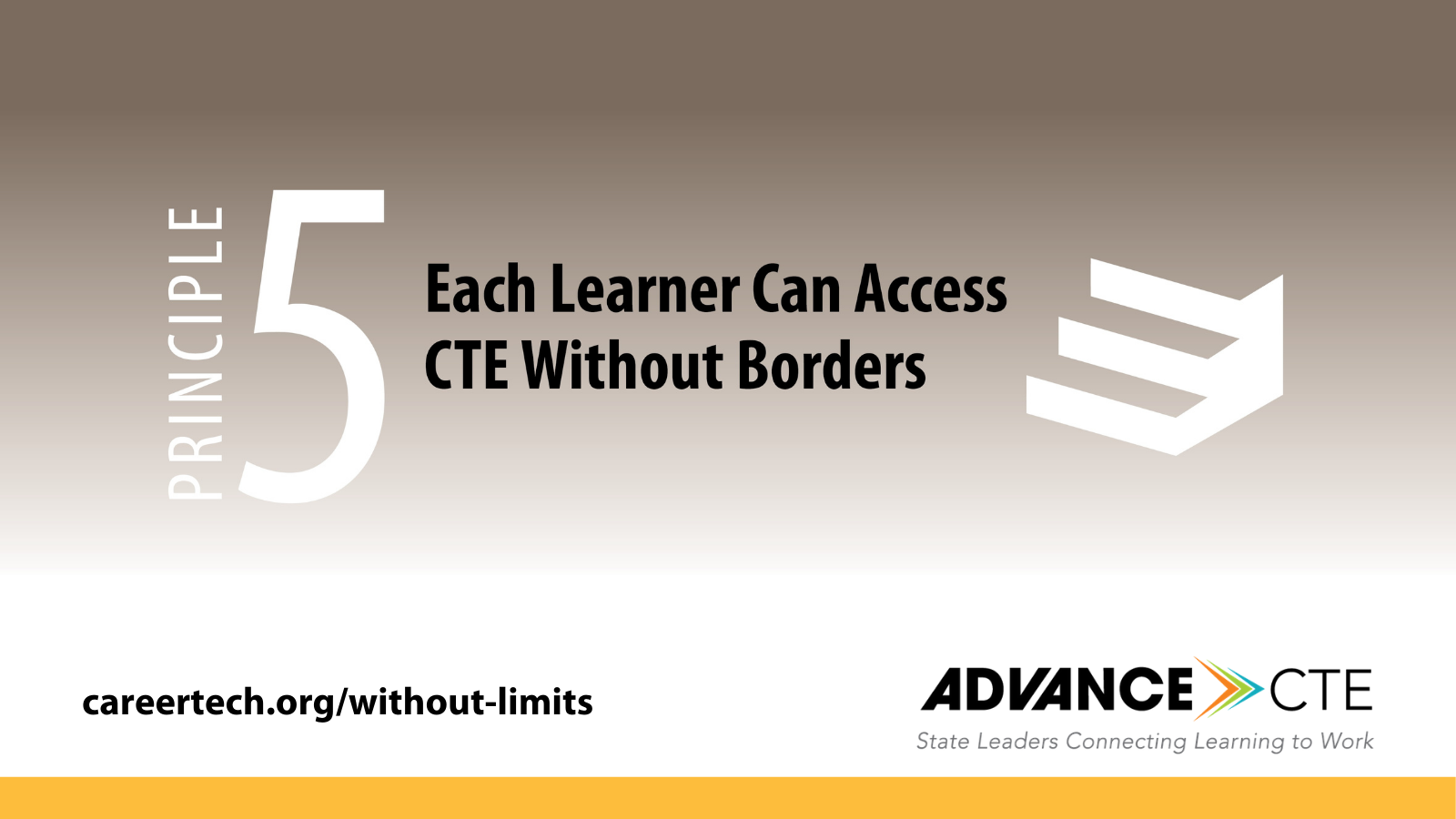Advance CTE wrapped up its five-part summer lunch and learn series delving into each of the five principles of Without Limits: A Shared Vision for the Future of Career Technical Education (CTE Without Limits). Each session features a panel of leading voices from organizations across learning and work followed by interactive group discussions on the information shared and next steps.

The fifth principle of CTE Without Limits aims to advance policies and actions that enable mobility and access to high-quality education experiences for each learner, with a particular focus on interstate compacts and investment in research and development to advance quality and equity in virtual learning. The August 31 panel featured Stephen Pruitt, President of Southern Regional Education Board (SREB); Dale Winkler, Vice President of Student Improvement for SREB; and Christina Sedney, Director of Policy Initiatives and State Authorization, Policy Analysis and Research for the Western Interstate Commission for Higher Education (WICHE).
Both organizations named CTE Without Limits as a valuable opportunity to apply a CTE lens to decades of work with states to remove geographic and policy barriers to expand education opportunities for each learner in their respective regions.
Key Themes
Establish shared goals with individual value – Sedney and Pruitt acknowledged that expanding the borders of CTE delivery both within and beyond state borders is complex and involves the input and commitment of many stakeholders. Sedney offered several tangible tips to build effective interstate stakeholder collaboratives, including establishing shared goals early in the process with an extra step – communicating the value of the goals to each stakeholder to encourage long-term commitment. Winkler reinforced the value of shared goals as a means to change how this work is approached from a limited, barrier-based mindset to a transformative, goals-centered mindset.
Leverage challenges as inter- and intrastate opportunities – In the breakout session, Pruitt pointed to the potential of this principle to address some of the most pressing issues facing the field, including instructor shortages and program access for rural learners. He provided the example of an instructor living in a border town that with effective interstate agreements could split teaching time between multiple states. Sedney named the recent influx of federal investment in broadband access as a “real moment of opportunity” to allow populations historically marginalized from accessing more flexible and virtual program delivery in both urban and rural areas to be able to do so.
Keep quality and equity at the forefront – Pruitt and Winkler elevated the importance of robust professional support for instructors to ensure that the current “crisis delivery model” of many virtual CTE offerings can transition to meaningful, high-quality programming for each learner. They also called out the need for further data analysis and research on outcomes from virtual learning to determine optimal curriculum structure and engagement models as well as to measure the impact of models on program completion and credential attainment. Disaggregation of this data is pivotal to learning the full story of these outcomes.
Resources to Get Started
SREB and WICHE provide multiple resources that apply lessons learned from decades of practice building effective interstate connections and systems. Additional resources from other partners aligned with Principle 4 can be explored in Advance CTE’s vision partner initiative repository.
SREB has a variety of resources aligned to Principle 5, including a listing of CTE-focused virtual labs and activities, as well as webinars and reports exploring the opportunities and challenges of open educational resources (OER).
WICHE leads multiple regional initiatives that can be considered as models for the state level across multiple vision principles, including the Interstate Passport for postsecondary transfer and a Multistate Longitudinal Data Exchange piloted in six states.
Recordings of all previous Lunch and Learn sessions and additional vision implementation resources can be found on Advance CTE’s vision page.
Continue your journey of deeper learning and evaluation of CTE Without Limits at Advance CTE’s virtual Fall Meeting October 27-28, 2021. The theme is “Meeting CTE’s Moment”, with plenary and breakout sessions highlighting top-of-mind areas for implementation and featuring current state practices aligned with vision principles. Visit the Fall Meeting page to view the full meeting agenda and register today to secure early bird registration savings of $50.
Stacy Whitehouse, Senior Associate Communications and State Engagement

